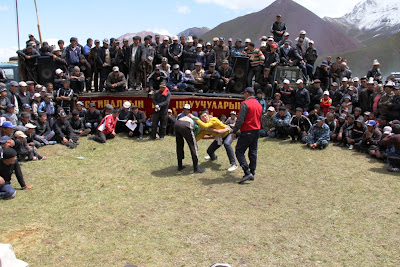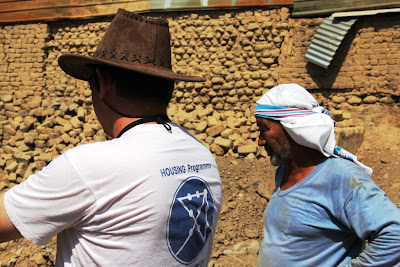Your eyes don’t even open as you you punch your mobile phone come alarm clock on the bedside table. A minute or two passes, and you find yourself sitting up, hunched over with a fan swirling the world around you. You take a few deep breaths and look around. Today it’s the Osh Guesthouse, you like it here.
You throw your clothes on and head outside into courtyard, noticing today the many roses and enlargened flowers. It’s a nice morning, and the sting of the heat is beginning to abate as September nears. Stretch, music, stretch, and you head out of the compound. It’s early, and there’s little traffic on the road, as you begin to run. The sun breaches the mountains to the east, defining what the colour orange is. Big and bright, it throws light over the corn fields that are as tall as a Kyrgyz weightlifter, waiting to be picked. Everything that you run past has an orange tinge, making it worthwhile getting up this morning. You continue to run, up the hill as a bus drives past and laces your jogging breath with dust. Further and further, higher and higher. You reach a little shop, your sign to turn along the river. The river is littered with water-wheels, bringing the water from the river into little pipes that feed the nearby houses. It’s a beautiful scene, and the water flows quickly even in winter. But something breaks your stride, as you pick up a fist sized rock. It sits there in the middle of the path, and you continue you run along the edge. You stare at it, and it stares at you. It’s tail goes down, ears flap back, and “woof woof woof!” Angrily, with every muscle in its body, almost bouncing off its forefeet and ready to pounce, it barks and barks. You know it won’t make a move while you continue to make eye contact, and have your guns in a menacing position filled with a rock. You run past it, and it retains its position barking. Eye contact remains even as you are twenty yards further down the road. For today, there will be three more dogs – one black, and two a dirty beige. Rumour has it the biggest dogs are bred to protect yurts in the mountains from bears and wolves, and you believe it. You get back to your guesthouse and piff the rock in the pile of others, home.
The team starts building around the white plastic table outside. One by one they arrive, to an empty table. Eventually, the guard comes out and informs us that the cook is at the other guest house, as Adina is on leave, we will need to feed ourselves. Today’s breakfast is simpler than the crepes we are useful, but pleasant all the same. The table is filled with grapes, peaches, boiled eggs, laptops and tea. At 8:30, the house will be empty.
A strange phone call in the morning, as you sit there at your laptop looking at another matrix in excel. Its hard to work out who it is what they want, but they are coming to visit you at 10:30. They arrive early, and introduce themselves, “We’re from the Eliminating Child Labour in Tobacco Growing Regions Foundation”. You struggle to hold back the laughs, as they tell you that Kyrgyzstan is one of their more significant programs. Is this the most specific mandate of any NGO you’ve met? Forty five minutes later, and your good deed for the day is done. They want to know where and what your organisation is doing, almost as if trying to fill in their agenda to justify flying from Switzerland.
You stare at your excel spreadsheets for several more hours. After lunch, you have a meeting with some program people. You want them to look at your excel spreadsheet, and they want you to look at their report. Quid pro quo, a deal is done, and the weekend will be long for both of us. You find out that his report is seventy pages, and your matrix is about five, as you mutter through it. Another assessment of livelihoods, another review of conflict mitigation in southern Kyrgyzstan.
Your housemate walks in to your office, fresh from the field. He’s been looking at houses, while you’ve been dealing with donor reports. It seems the houses have been built quicker than anyone expected, but there are more important things to discuss. Why have you got all these extra undies, and where’s your socks? Your favourite running socks! Unfortunately, they’re not his underwear and he doesn’t have your socks. You chase him around the office, up the stairs, and around the water tank trying to see what socks he is wearing... to no avail.
Before it seems the day had even started, the clock strikes 5:30pm and the local staff are ready to go. But first, there is overly sweetened sponge cake with layers of icing being pulled out of the fridge and plenty of flowing soft drinks to be drunk. After six months running the mapping unit, the program manager is leaving and heading to Uzbekistan for his next adventure. Six months, and literally tears are flowing. The beanpole of a man has made an impression on people, a smiling, laughing, fun to be around guy who just loves to impart his knowledge on people. People take it in turns saying speeches, and then finally, the nod is given and the cake is allowed to be eaten. Two minutes later, the food is scoffed and you head back to your respective office to continue the monotony.
The sky is dark, the halls are all but empty, and the driver is waiting. You wonder whether its worthwhile, but almost to give him something to do, you jump in the Lada Niva and travel no more than 500 meters up the road back to the guesthouse. The benefit of living with a bunch of Frenchies is that every time they return from their motherland, without fail they pack their bags with cheese, wine and fine foods. And this welcome home, is no different. You sit around the table, discussing the latest matrix, as you gulp down a fine white that you couldn’t even attempt to pronounce, while eating potatoes cooked in cheese with a cheese, salami, cheese, bread and cheese on the side. It makes you wonder what the chemical relationship between this cheese and the Russian rubber they call cheese is... not much.
Tomorrow you eat the egg that will leave you empty for five days.














